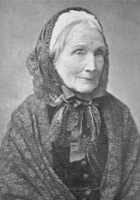Robert Burns. Poem by Bessie Rayner Parkes
Robert Burns.
A HUNDRED years ago, when George was King,
The second monarch of his race and name,
The man was born whom we are met to sing
Because he won by verse a world-wide fame.
The gentle pasture-country, whence he came,
To-day is vocal with his vigorous song;
Our rudest western isles repeat the same,--
And English voices will the strain prolong
Where'er are heard the accents of the English tongue.
To inarticulate yearnings of the heart
He gave a voice which millions learnt to use;
And those who lisped the music of his art
Must not forego this day the grateful dues
His country owes unto that manly muse.
All household love, all patriotic fire,
He sang in noble words none can refuse
To adopt into their speech, a fond desire,
Nursed early in his heart and quivering in his lyre.
Born of a peasant, as a peasant bred,
He drank the simplest milk from Nature's breast;
Him as a weanèd child the old dame fed
With other lore she wots of, unconfessed;
Of fairies, brownies, kelpies, and the rest;
Her children, and not less than we her own;
Whom I, indeed, do think she loves the best,
As being beyond our pale cast out alone;
All these to little Robert early she made known.
And in imagination he abode
Much with these beings of the middle air;
Often the witch's broom-stick he bestrode,
Or to their feasts with warlocks did repair;
To meet with ghosts he did not quite despair,--
But inly cherished this unearthly lore,
Which for a poet is beyond compare.
So the boy brooded o'er his hidden store,
And wrapped himself in eerie visions more and more.
Yet none the less, as being a son of toil,
To hardest daily labour was he bound;
His lot it was to till a thankless soil,
And wrestle bread from the unwilling ground,
Weaving young verses to the ploughshare's sound.
Scant fare and scanty clothing had the child,
Who one day should be great and famous found;
But songful spirits early on him smiled,
And with their spells a poor and struggling youth beguiled.
While yet his summers were but scarce fifteen,
Love found him standing midst the shocks of corn;
Nor thence unto his latest hour I ween
Did the dear goddess leave him quite forlorn;
And do not thou, O Christian, think it scorn,
If I believe that with transfigured feet
She waited on the slopes beyond the dawn,
And being herself redeemed, those two did meet
And walk the heavenly hills in raiment fair and sweet.
For the youth's heart, though often led astray,
Had yet high instincts for the true and pure,
And gradually cast out its gods of clay,
And shunned the unclean form of each allure.
The names of husband and of sire assure
Sweet natural safeguards against evil thought;
But much, alas, this poet must endure,
Ere from the ways of sin he can be brought,
And find the household rest his better nature sought.
Amidst the revel of ungodly men
Too often that melodious voice was heard;
The fire-tipped satire of that matchless pen
Too oft a lower loyalty preferred,
When better conscience in his bosom stirred.
His clear descent from all the bards of eld,
The great commission which his soul revered,
Often as these high thoughts within him swelled,--
Alas, how lightly yet were his Insignia held!
Then great men flattered him, and wise men saw
Amazed the ploughman in their middle stand,
With lips uncultured treat of social law,
And bear him with the noblest of the land;
He who must win his bread by toil of hand!
Old Edinburgh flung wide her haughtiest doors,
And crowned him whom she could not understand;
And Burns found welcome on those thronging floors,
While Beauty lavished smiles, and Wit his richest stores.
And yet they held not out a helping hand,
But left him, ruthless, to the flail and plough.
The modest independence he had planned,
How shall he win that simple guerdon now!
Must poverty's cold hand depress him low?
How many bitter thoughts and carking cares
Must weigh on that imperial brain and brow!
Alone the burden of his days he bears,
And when he thinks on Jean, the husband's heart despairs.
At length the humble post he needs he gains;
His wife and children, exiled from his arms,
Are once more his, a balm for all his pains;
And Home and Poesie have surely charms,
Far from great cities and their spiritual harms.
Alas! alas! 'tis but a few short years
Ere cruel fate each envious tongue disarms;
And he whom each low heart in secret fears,
Lies dead in manhood's prime, 'mid Scotland's useless tears.
What is the moral of this simple tale?
Nations! who know your great men ere they die,--
At least let your unwonted love avail,
That they in obscure poorness shall not lie;
But, as you deem them great, exalt them high!
And ye, O poets, when you read the same,
Seek not the gauds of human dignity;
Your food and raiment, and the poet's name,--
These should be all you need! not this world's wealth or fame!
This poem has not been translated into any other language yet.
I would like to translate this poem